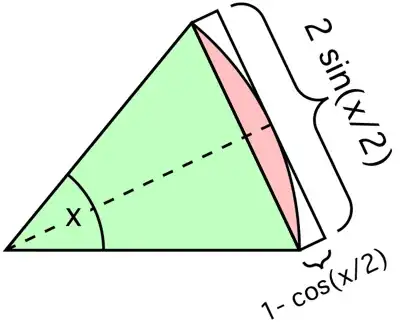Prove that the following inequality holds for $x\ge0$ :
$$\sin(x) \cos(x) \geq x-x^3$$
This is an inequality often met during my high school classes I also used for this problem yesterday. I'm interested in a non-calculus proof if this is possible.
Proof involving calculus:
Let's consider
$$f(x) = \sin(x) \cos(x)-x+x^3$$ then $$f'(x) = 3 x^2-2\sin^2(x)\tag1$$ $$x\ge \sin(x)\tag2$$ From $(1)$ and $(2)$ we immediately notice that $f'(x)\ge0$ and taking into account that $f(0)=0$ we may conclude that the inequality holds. Thanks.
